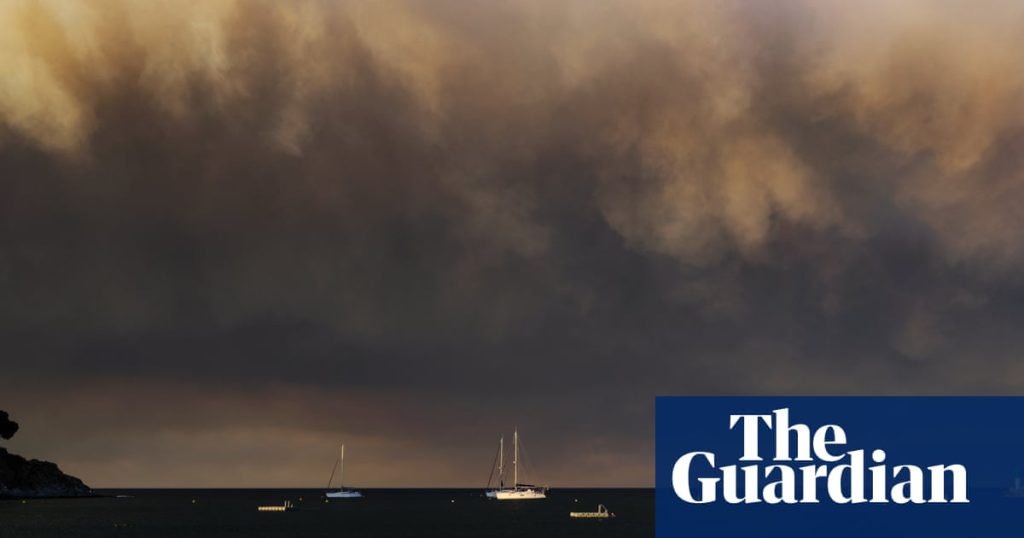It was a prediction nobody wanted to hear. On the main stage of the world’s biggest tourism fair, Stefan Gössling, a leading researcher in sustainable transport, had just calmly announced the looming death of the holiday industry.
“We have already entered the beginning of the age of non-tourism,” said Gössling, to an uneasy audience of travel agencies, car rental companies, cruise operators and hoteliers.
That prophecy may sound fanciful to holidaymakers in Europe and North America who have been jetting off this summer – as well as to industry executives delighted to see international tourism return to pre-pandemic highs last year – but Gössling argues that as carbon pollution stokes heatwaves, fuels wildfires and ruins harvests, the cost of foreign travel will soar, and fewer people will be able to afford it.
“Eighty years ago, mass tourism started in Europe,” said Gössling, a professor at the business and economics school at Linnaeus University in Sweden, who has consulted for the UN and the World Bank. “Eighty years from now, I’m doubtful there will be much tourism left in the world.”
Gössling is not short of examples of destinations already feeling the squeeze. Warm weather is melting snow that keeps Alpine ski resorts alive. Coastal erosion is stripping sand from southern European beaches. Droughts are forcing Spanish hotels to ship in fresh water as swimming pools lie empty, while wildfires are setting scenic Greek islands ablaze.
The South Aegean islands in Greece, which include the tourist favourites Kos, Rhodes and Mykonos, are the “single most critical” hotspot on the continent, according to a study Gössling co-authored last month combining exposure to climate hazards with dependence on tourism. Next are the Ionian islands, which include Corfu.
The financial strain caused by these issues, which travel companies will probably pass on to customers, will be compounded by the rising cost of food – from coffee to chocolate to olive oil – and the increasing need for insurance against extreme weather.
“At the moment, it’s locally concentrated,” said Gössling, speaking to the Guardian earlier this year at the ITB Berlin, the world’s largest gathering of tourism companies. “But in the future, it will become more frequent, cover more places, and turn into something disruptive.”
Whether this rise in costs could outpace expected growth in global incomes is up for debate – some damages can be avoided through adaptation, though this, too, comes at a price – but tourists may feel the pinch even in scenarios that keep volatile weather under control. If carbon pollution does fall sharply – necessary to stop global heating – it will cost the most in sectors such as aviation, which is limited by physical constraints.
Some governments hope to slap carbon taxes on flights to help finance the energy transition and compensate poor countries for damage caused by fossil fuels, and green groups are pushing for a frequent flier levy, which would increase duties for each extra flight in a year.
Despite Gössling’s blunt assessment of the tourism industry’s efforts to decarbonise – “what the whole sector is doing is greenwashing” – he is seen as a crucial voice in the industry, with the conference billing his speech a “must-hear session for anyone who cares about the future of travel and our planet”.
Some things are moving in the right direction, he added, such as hotels putting solar panels on their roofs and people beginning to acknowledge the problem.
“We have a huge difficulty making the step from there to action,” said Gössling. “But people have realised they are running into risks, and want to understand business risks. The message is not welcome, but it certainly makes people think.”
In academic circles, Gössling is best-known for studies that put numbers on the growing carbon footprint of tourism (8.8% of planet-heating pollution) and the inequality in aviation emissions (only 2-4% of people fly abroad in a given year). His finding that 1% of the world population are responsible for half the emissions from air transport has underlined activists’ calls for governments to make premium and business travel a priority.
“If that group travelled half as much – which still is a lot, it probably would still be sufficient even for business travellers – we could cut [aviation] emissions by 25%,” he said. “Just by making a very tiny group travel a little less.”
But he is also quick to counter arguments that ordinary people in rich countries can keep flying to far-flung places and justify it by pointing to even more polluting demographics. “Our headache is long-haul travel,” he said, mentioning gap years and Gen Z influencers who sell travel as an aspirational lifestyle.
“Everyone sees tourism as a system, where governments and companies are responsible,” said Gössling. “But we are the system. It’s our individual actions that accumulate to global problems.”

